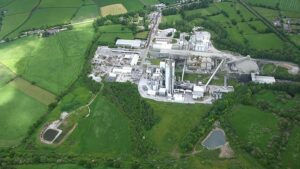Mitsubishi Heavy Industries, Ltd. (MHI; Tokyo) announced that its technology is being deployed by leading global cement manufacturer Heidelberg Materials UK, for Front End Engineering Design (FEED), to further study the specifications of a CO2 capture plant at Padeswood Cement Works in Flintshire, U.K.
This contract has been awarded in accordance with the progress made by the Padeswood CCS (carbon capture and storage) project planned for the site. MHI was selected after working on the initial competitive Pre-FEED (Note) project study awarded in 2022.

Padeswood cement works (photo courtesy of Heidelberg Materials UK)
The project is part of the HyNet CCUS (carbon capture, utilization and storage) cluster in the North West of the UK, which plans to capture up to 800,000 tons of CO2 annually from flue gas produced during the cement manufacturing process and store it in a depleted gas field off Liverpool Bay. The CO2 capture plant could start operation in 2028. As well as the direct benefit of decarbonizing the industrial process, enabling the production of carbon neutral cement is key to supporting a low carbon supply chain to the construction industry.
This project is a partnership between MHI and Worley, a global professional services company of energy, chemicals and resources experts, and will implement the basic design of the CO2 capture plant using the “Advanced KM CDR Process” proprietary CO2 capture technology developed jointly with The Kansai Electric Power Co., Inc.
Kenji Terasawa, CEO and Head of Engineering Solutions at MHI, said: “The cement industry is `hard to abate’, because CO2 emissions cannot be avoided in the production process. Heidelberg Materials UK has committed to reaching net zero carbon by 2050 and will be deploying our proprietary carbon capture technology, the Advanced KM CDR Process™ to tackle this challenge – leading the way in the UK’s cement industry. We are proud to contribute to the effort on this commitment through the Padeswood CCS project.”
Simon Willis, CEO, Heidelberg Materials UK, said: “This is a decisive next step in our plans to install carbon capture technology at our Padeswood cement works. Once operational, it will provide net zero building materials for major projects across the country, enabling us to help decarbonise the construction industry and meet our ambition to become a net zero business.”
Marino Barbi, Senior Vice President UK for Worley commented “Worley, together with our partners MHI are delighted to have been selected by Heidelberg Materials for their Padeswood CCS FEED project. This is a first of its kind CCS development in the UK and our appointment is testament to the strength of our relationship with Heidelberg Materials and MHI, our execution of the pre-FEED and Worley’s extensive CCUS capabilities.”
The UK Government has set a target to achieve net zero carbon emissions by 2050. In line with this initiative, the requisite infrastructure, including formation of CCUS clusters, is being developed to carry out all related processes – from CO2 capture to transportation and storage – at each of the country’s targeted industrial zones. The HyNet CCUS cluster, which includes this project, was selected by the then UK Department for Business, Energy and Industrial Strategy (BEIS) as a storage site in October 2021. This is still being supported by the subsequent new department, the Department for Energy Security and Net Zero (DESNZ).
The project also was selected as a specific CO2 capture and storage project by the UK Government as an effort to promote decarbonization in the cement industry, which in the hard-to-abate sector means the difficulty of reducing CO2 in the production process.
MHI Group has formally declared its intent to achieve carbon neutrality by 2040, and is now working strategically to decarbonize both the energy demand and supply sides. A core element of the Company’s “Energy Transition,” which targets decarbonization on the energy supply side, is the development of a CO2 solutions ecosystem integrating diverse sources of carbon emissions with modes for carbon storage and utilization. Going forward, MHI Group will continue to strongly promote the CCUS business by utilizing its proprietary CO2 capture technology, and as a solutions provider, contribute to the reduction of greenhouse gas emissions on a global scale, and further develop solutions that help protect the environment.